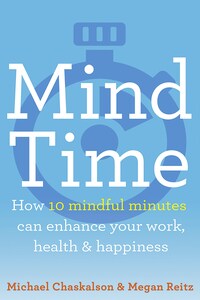Thorsons
An imprint of HarperCollinsPublishers
1 London Bridge Street
London SE1 9GF
www.harpercollins.co.uk
This edition published by Thorsons 2018
FIRST EDITION
Text © Michael Chaskalson and Megan Reitz 2018
Cover layout design © HarperCollinsPublishers Ltd 2018
A catalogue record of this book is available from the British Library
Michael Chaskalson and Megan Reitz assert the moral right to be identified as the authors of this work
All rights reserved under International and Pan-American Copyright Conventions. By payment of the required fees, you have been granted the nonexclusive, non-transferable right to access and read the text of this e-book on screen. No part of this text may be reproduced, transmitted, downloaded, decompiled, reverse engineered, or stored in or introduced into any information storage retrieval system, in any form or by any means, whether electronic or mechanical, now known or hereinafter invented, without the express written permission of HarperCollins e-books.
Find out about HarperCollins and the environment at
www.harpercollins.co.uk/green
Source ISBN: 9780008252809
Ebook Edition © March 2018 ISBN: 9780008252816
Version: 2018-01-12
Your mind is extraordinary. Your mind. The mind that, right now, sees black marks on white paper and effortlessly turns them into bundles of meaning. The same mind that sees the word ‘sunset’ and fluently converts it into an inner vision of colours and shades. Without even trying.
How extraordinary. How miraculous.
To perform its amazing feats, your mind has an information-processing capacity greater than the combined power of all the computers, routers and Internet connections on Earth. Did you know, for example, that a tiny piece of your brain, the size of a grain of sand, contains 100,000 neurons and 1 billion synapses all communicating with each other.1 The brain is the mind’s supercomputer. It can connect 100 trillion bits of information.
So with this amazing capacity available to us, how do we use our minds?
The simple answer is, not as well as we might. For a start, about half the time we are awake we are thinking about something other than what is going on at the time.2 And we keep trying to multitask – ordering a pizza while walking the dog and Skyping a cousin in Australia. Recent research, however, shows multitasking significantly reduces our overall performance.3
Then there are all the things our minds do on autopilot. Do you wake up in the morning and reach for your phone, blearily checking your emails while still lying in bed? Do you sit in traffic on your way to work scowling when someone beeps their horn, without even considering that they might be trying to tell you something useful?
The fact is that we are only aware of a tiny fraction of what we are thinking, feeling and sensing – so we’re barely conscious of how and why we behave the way we do. It’s as if we have a large, elegant, state-of-the-art ocean-going cruise liner at our command and all we use it for is chugging about the harbour.
The problem is that although we have all that enormous potential at our disposal, our minds don’t come with an instruction manual. As miraculous as they are, we don’t know how to use them to anything like their full capacity. All we get is some rudimentary guidance.
We’ve all been educated to some extent. We’ve learned to do calculations and construct sentences; we’ve maybe learned history, geography, science, technology, languages or commerce. We can cook and shop, work the Internet and drive a car. We can do our jobs. We might even have mastered some of these to a very high level. But it’s not the same. We still don’t use or direct our minds effectively. And that affects the way we relate to others, the way we feel, the way we think and the way we experience the world around us.
Most of the time our minds just run on automatic and we’re barely aware that they’re doing that. This keeps us confined in the narrow space of our habits. Mentally, emotionally and in our behaviours, we keep doing what we’ve always done – and we keep getting what we’ve always got. Sometimes we manage to break out into new ways of doing things. But often, with a sad predictability, these new resolutions and good intentions don’t last and we flip back to automatic again.
That’s the bad news. The good news is that we can do so much better, and it’s not that hard. We just need to know how to use our minds more effectively.














